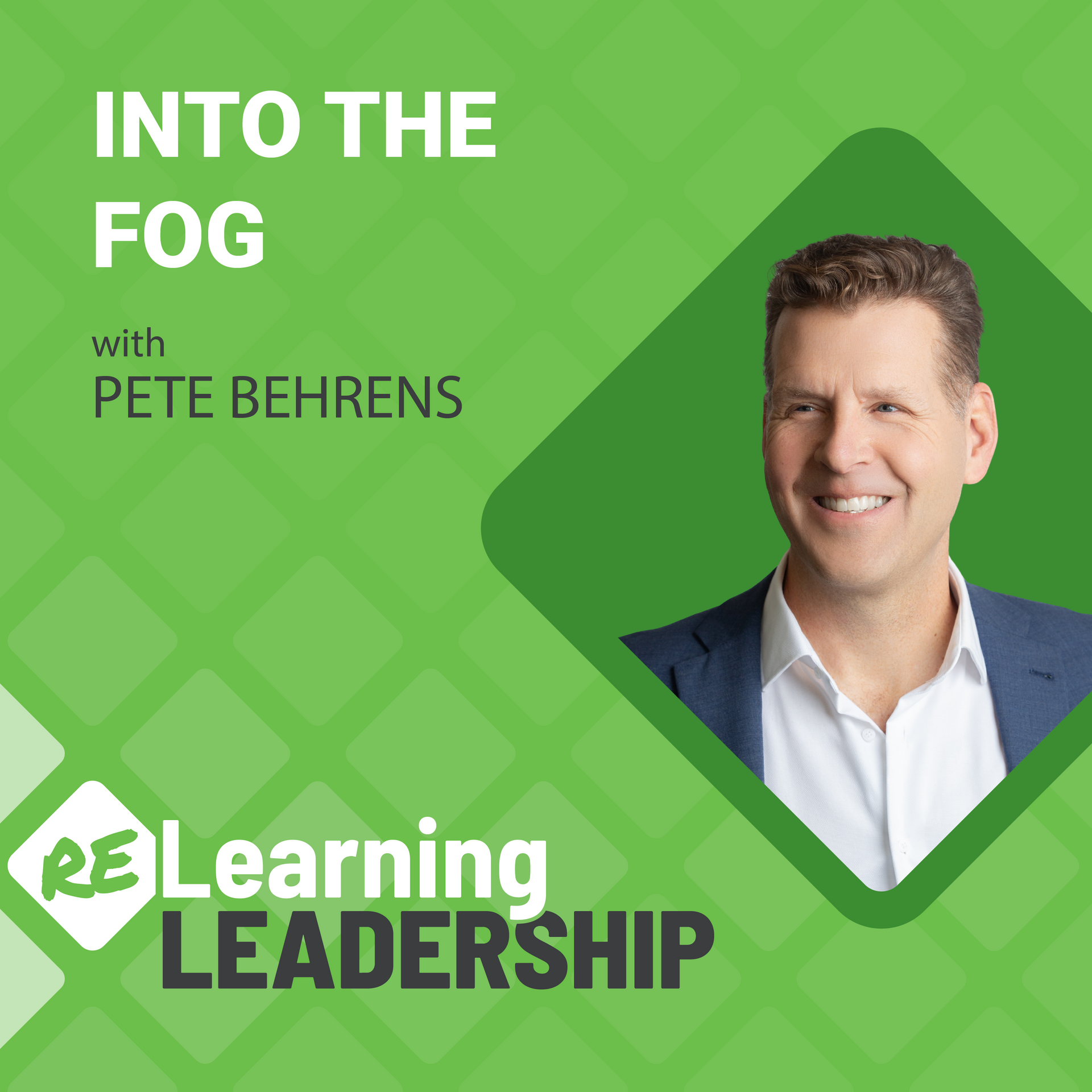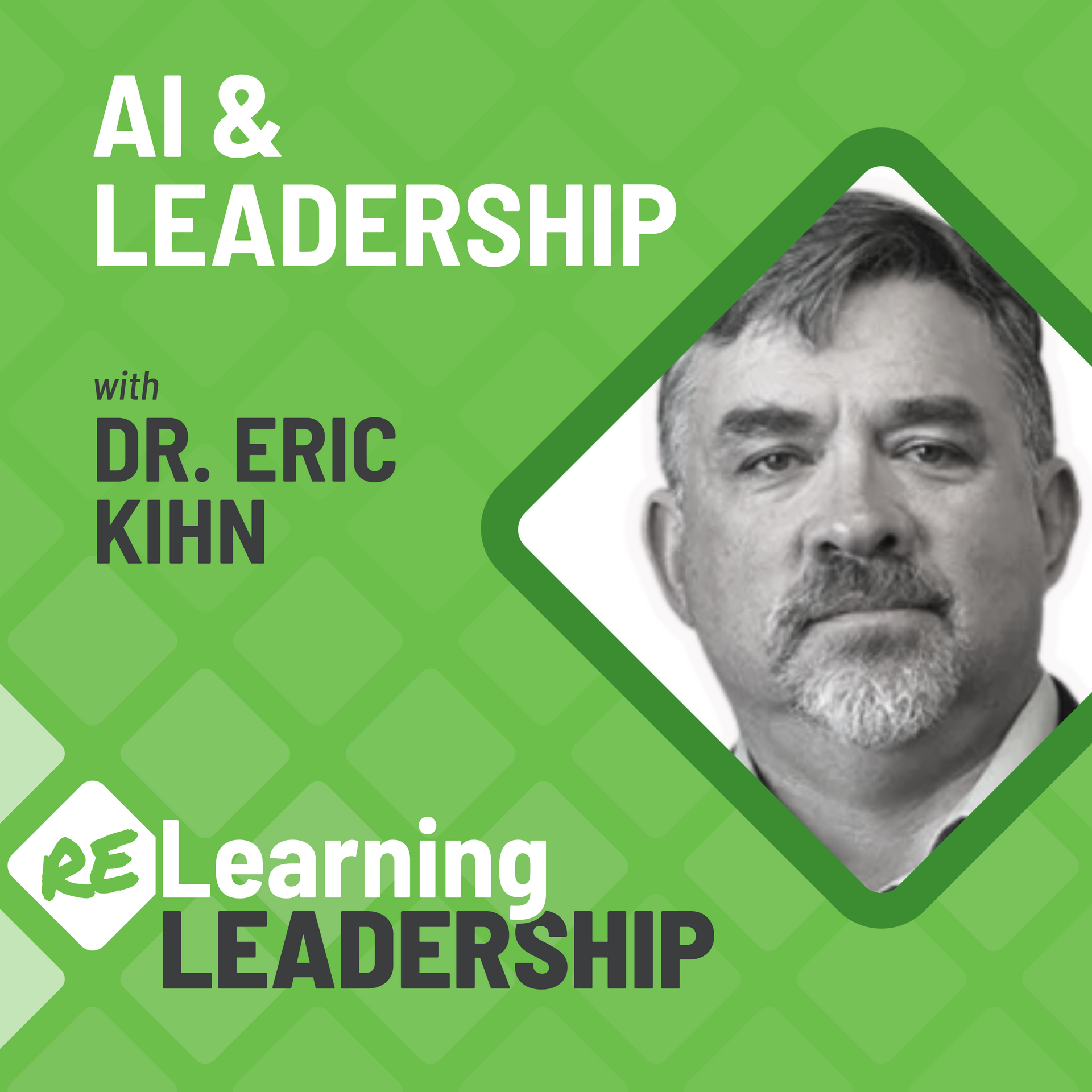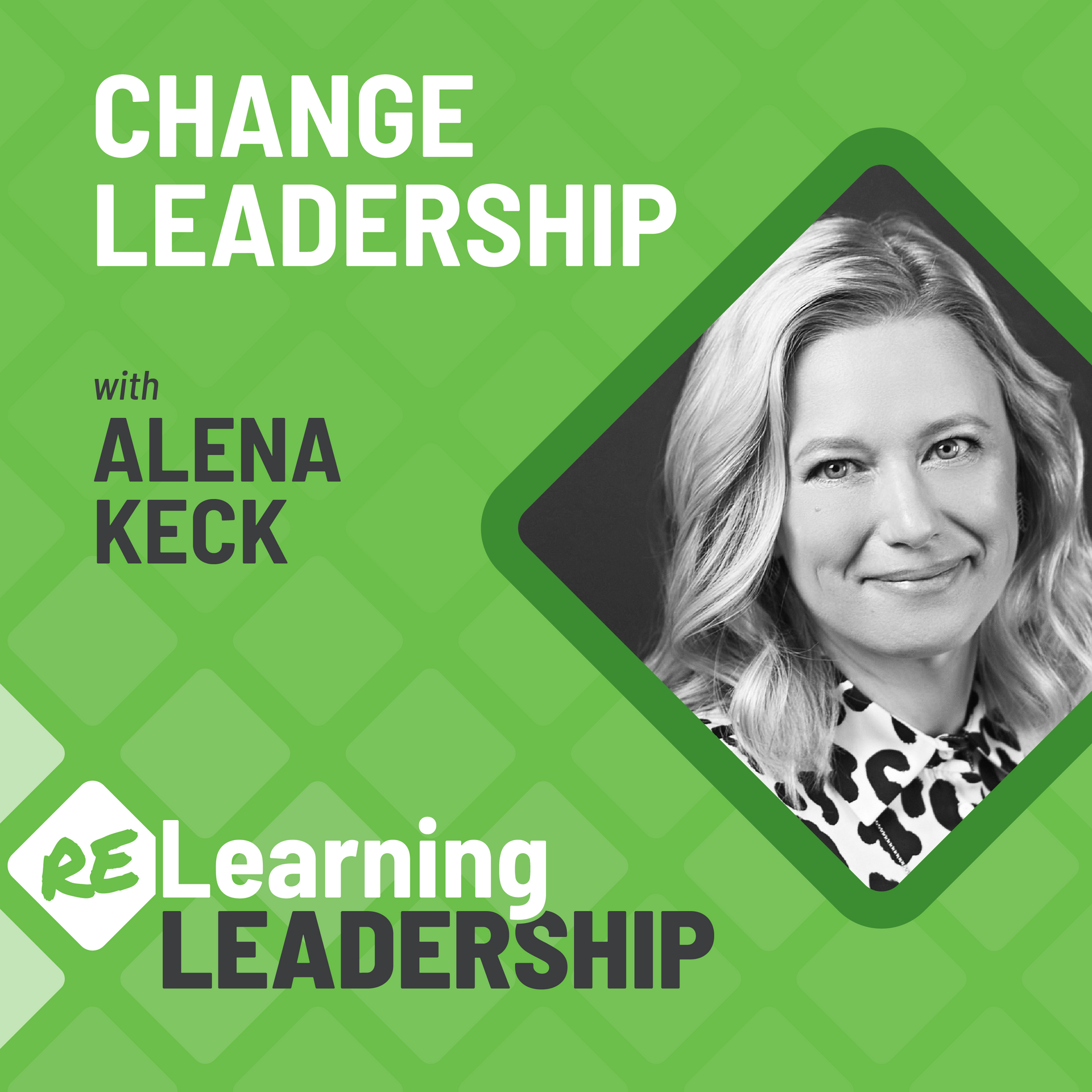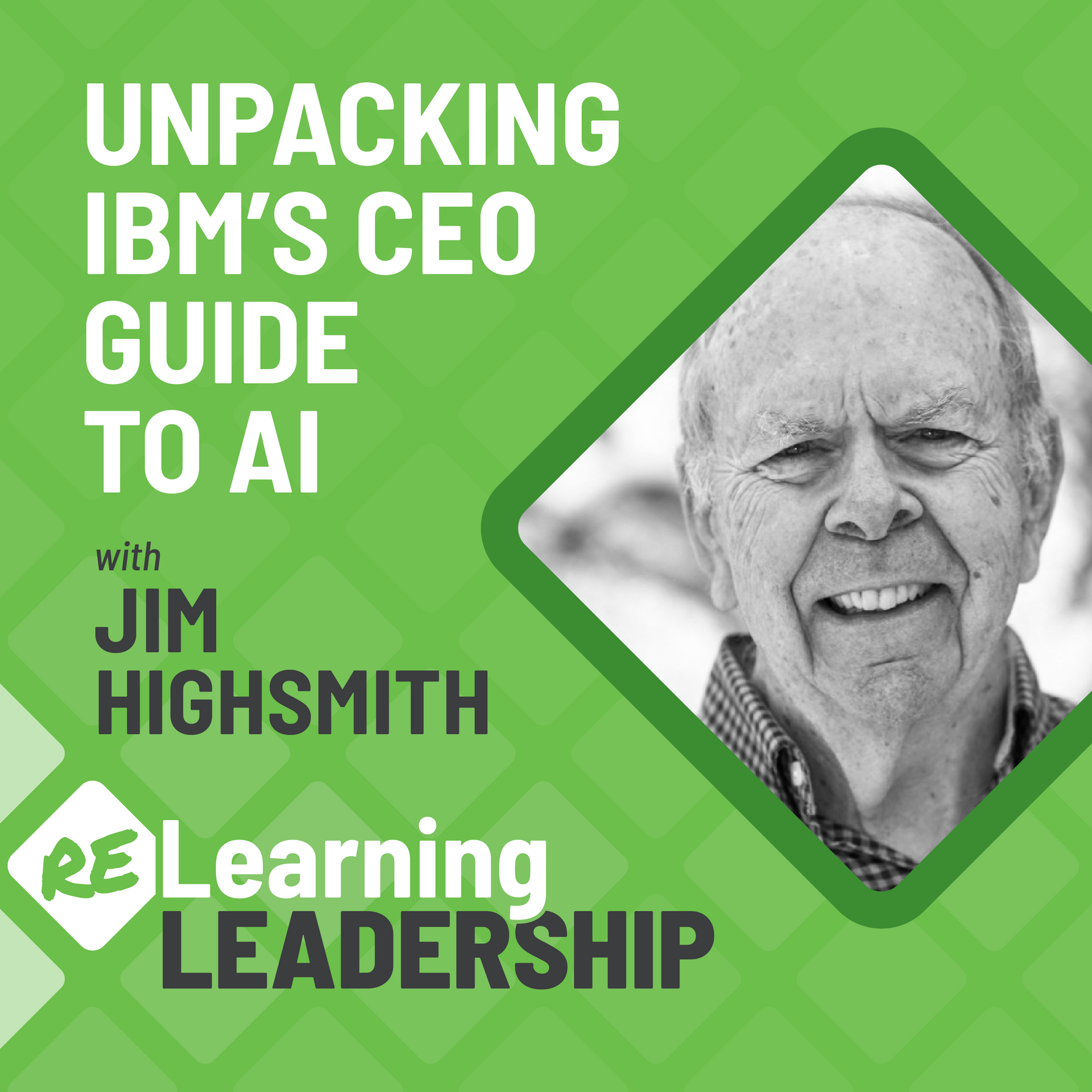6: Connecting in a Disconnected World
How can connected leaders create cultures of inclusion?
Von Rhea, a Senior Director of Engineering at Trimble, shares his story of scattered teams across the globe - across 12 international offices! - and his ongoing leadership challenge to bridge diversity, engage these unique voices and connect across this disconnected organization.
Melissa Uribes, Vice President of Diversity, Equity and Inclusion at Trimble, joins Pete to discuss Von’s disconnected situation and what leaders can learn from his story to build better connections across their diverse and distributed organizations.
Von Rhea, Senior Director of Engineering
Von Rhea is a Senior Director of Engineering at Trimble, a global industrial technology solutions company. He has over 30 years in technology, project management and organizational leadership with Booz Allen, Corporate Express / Staples, and others.
Today, Von has responsibility of product development and engineering for multiple product portfolio. His global team responsibilities have built up over the years to now include 12 international locations. Pre-COVID, this kept Von on planes, trains and automobiles quite a bit. Today, it keeps Von on video calls from 5AM to whenever he decides to cut it off. Leadership in this global diverse economy is a challenge whether travel is allowed or not!
In his free time, Von enjoys the beautiful Colorado outdoors hiking with his dog, Moose, and skiing with friends.
Connect with Von
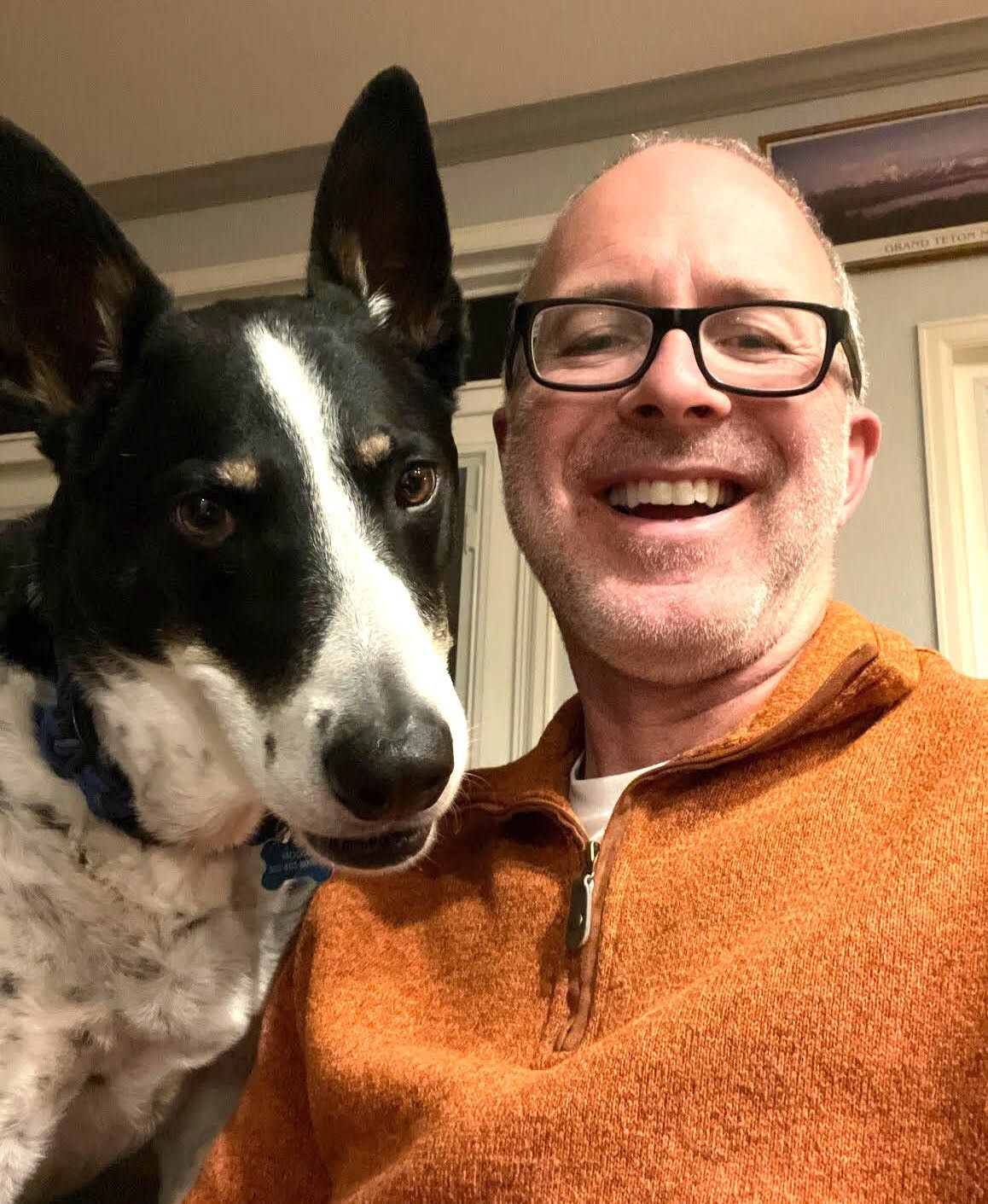
Melissa Uribes, Vice President of Diversity, Equity, and Inclusion
Melissa Uribes (she/her) is the Vice President of Talent, Diversity, Equity and Inclusion at Trimble. She has over 20 years working in a variety of industries as a People Experience Leader and Human Resources Business Partner.
She leads the Talent team at Trimble which is focused on global Talent Attraction and Recruitment, People Engagement and People Development programs.
She also leads a global team focused on executing the company's DEI strategy which is focused on Transforming the Way People Work Together to foster a culture where everyone feels respected and valued for their unique identity and they have the opportunity to contribute and belong.
Connect with Melissa
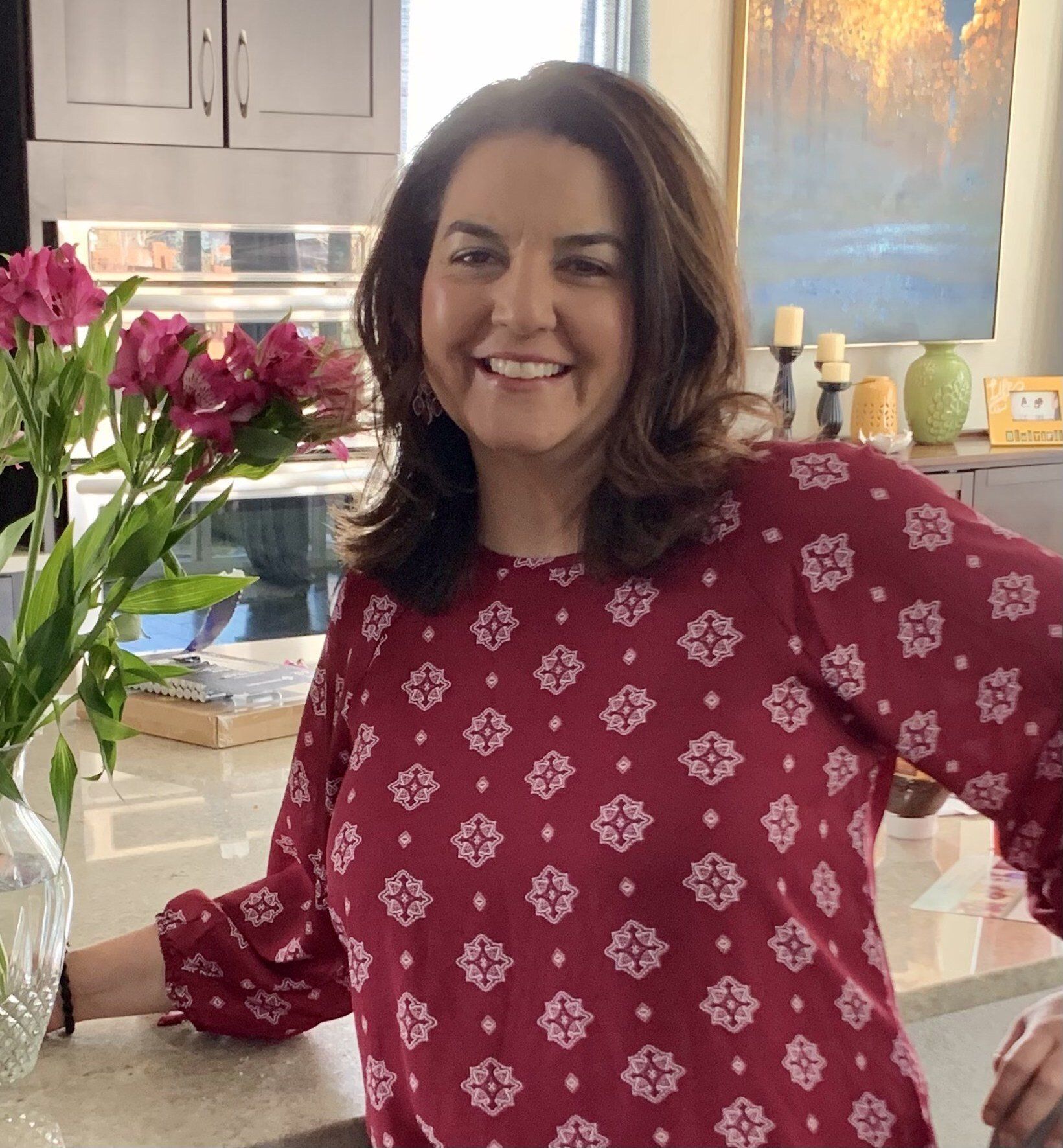
Relearning from Von's story…
Make Connection a Priority. Now more than ever, people need connection. It is too easy to get sucked into the business side of our job as leaders. Connected leaders create an intentionality of connection. They make people a priority and they give them attention.
Step Back and Listen. Diversity, inclusion and connection happen when the leader creates space for it to emerge. Connected leaders seek first to understand before being understood. Employees need a psychologically safe space to not only feel included, but to grow into highly productive contributing members of the team who are able to challenge the system.
Acknowledge and Celebrate Failure. Mistakes will happen. If leaders do not allow mistakes during the design and development process of our work, bigger problems will be pushed to a breaking point and critical business failure might occur. Connected leaders create space in the process for learning from mistakes. They set an example that even as leaders, we make mistakes and are open to learning from them.
Practice Every Day. We’ve all experienced the corporate team-building games. And while these events are fun (at times), a culture of connection is built every day, in every meeting, and every conversation. Connected leaders show up everyday for practice, not just for the games. Trust and inclusion is built through the micro-moments of everyday life.
Episode Transcript
Pete Behrens:
How can leaders improve connection in a disconnected world? Welcome to another episode of Relearning Leadership, where we explore a specific leadership challenge and break it down to help improve your leadership, your organization, and even your personal life. Today, we meet Von Rhea, a senior director of engineering at Trimble, responsible for teams across 12 countries. Through Von's lens, we get a sense of the connection challenges for today's global remote leaders.
Von Rhea:
It's a mixture of what's happening in the world, what's happening in the company, what's happening in your own career, and trying to navigate any one of those on a daily basis is a true mine field.
Pete Behrens:
Following Von's story, we connect with Melissa Uribes, vice-president of talent, diversity, equity, and inclusion at Trimble, the same company Von works for. Through her, we explore what Von is doing to improve connection across his diverse landscape and how we can relearn to be better connected leaders in our own disconnected world. I'm your host, Pete Behrens, founder of the Agile Leadership Journey and 30 year veteran in corporate leadership, both as a leader myself and in guiding other leaders. Thank you for joining our journey of Relearning Leadership. Let's dive in with Von and Melissa. Welcome to the show, Von.
Von Rhea:
Thanks, Pete. It's great to be here on a snowy afternoon on a Friday.
Pete Behrens:
Well yes, it's, I think, one of the coldest days we have here in Colorado, and as always it's great to get a chance to be with you. So thanks for being here.
Von Rhea:
Thanks for the invite.
Pete Behrens:
So just to give us a little bit of context on our session today on remote leadership and how leadership is really changing in today's global economy, could you describe briefly for us your current responsibility?
Von Rhea:
Absolutely. My current responsibility is an engineering director for Trimble based in Westminster, Colorado, and our particular division has been built over the past 10 years, 10 plus years through about 12 to 13 acquisitions. So my job at the moment is to bring the engineering capacity of those acquisitions together and create a global team versus product and geographic centric teams. So as a result, I have engineering teams in about 12 locations around the world. A couple in India, one in Romania, several in Europe, and then a couple in North America.
Pete Behrens:
Wow. Now that is quite a spread and I can imagine that that pre-COVID kept you on the road quite a bit.
Von Rhea:
Pre-COVID kept me on the road quite a bit. Now it feels I don't sleep after about five o'clock in the morning.
Pete Behrens:
Well, welcome to my world. That's my wake up time to. Maybe just to give us just slightly more context here, you haven't always been this global leader and I've been fortunate enough to follow your career a bit through multiple companies. Can you give us maybe just this brief arc from being that local manager to a global leader?
Von Rhea:
Yeah, absolutely. I think, Pete, when you and I met back in the early 2000s, my entire team sat with me in Broomfield, Colorado, and we started the agile journey together. From there, again, through an acquisition, I started to have teams in India, Massachusetts, and Colorado, and that has just fast forward to where we are today, all my teams are pretty much remote or global. In fact, my first four years at Trimble, not one member of my team sat in the location that I was located in. So my entire career at Trimble has been remote leadership.
Pete Behrens:
Well Von, I'm pleased to have you here as I think you can represent the challenge many remote leaders are seeing today. What are some of the challenges you're facing?
Von Rhea:
Well, you know, it's very interesting when you want to take global teams or remote teams, because this is actually true even when all of your teams are located in the US and you don't sit with them, and helping them learn new practices, but also unlearn practices. And I think the activity of unlearning is as important as learning. So while we've been learning agile along the way, as a way to be consistent across our development methodologies in 12 different locations, the teams have had to unlearn what their legacy development practices were. And they may have done code reviews in a particular way, and we want to have them learn in a different way. So the great thing about a lot of the new tools that we have in the development world and a lot of the new frameworks is that they are helping people unlearn older practices at a rate equivalent to or exceeding what they're actually learning. So a lot of us are going through this process of unlearning stuff as fast as we're learning.
Pete Behrens:
Wow. I'm curious from your leadership perspective, what are you having to unlearn in leading this group?
Von Rhea:
I was afraid you might ask that question. And I think I would say one of the things that I've had to unlearn is how to have an exterior shell, and a I know all the answers kind of approach to things. If I let myself be a little bit more vulnerable, if I let others provide the answers, that's an unlearned behavior for me as a leader, and it's been one that's been incredibly rewarding to actually work on. One of the things that I do for myself is I do watch a few videos or webinars every quarter just to make sure that I am continuously staying up on ways to become more vulnerable, better ways to communicate. And those are not natural behaviors that I necessarily had in the beginning.
Pete Behrens:
Huh. I think that's awesome, in a sense, the way you're showing up. And when we teach that in our workshops we talk about most leaders are set up in an area they're an expert at. Software development. You're a software deployment manager. And the vulnerability it takes to step back from saying, "I don't know," or, "Maybe there's another way," is really a big step. And I know it's a hard one for a lot of managers, whether it's remote or not, in a sense, it's just that ability and willingness to let go of some of the expertise.
Von Rhea:
And while I have responsibility for products all around the globe, there's no way I understand the customer behavior of how those products are used everywhere around the globe. So I really do have to rely on people to bring their feelings and their insights and their intuitions forward. And I think innovation is the other part. Innovation is very hard right now for our products. Where I see innovation happening, which is very interesting to me, is people are becoming much more efficient in the way they work internally. So their processes, they're figuring out how to do things quicker, more efficient internally, so the innovation is almost inward for this past year versus outward.
Pete Behrens:
That's interesting. You think about where creativity comes from and it's that intersection. I remember Steve Jobs' biography talking about Pixar, and he was describing a space in Disney where everybody had their own isolated space. And he said, that's great for team productivity, but it sucks for creativity because creativity is those sparks from the outside. And he said they have no outside sparks. And what you're describing, it reminds me a lot of that, that this creativity is probably that the innovation and the products requires that external spark. And none of us are getting that so much. We're kind of isolated in our caves.
Von Rhea:
It's very difficult. Very difficult.
Pete Behrens:
That's an interesting aha that you just sparked in me. That's awesome. So I can imagine you're not totally happy with where you're at as a leader. It sounds like you're on a path to grow. What is it that you're finding yourself working on mostly in terms of your own growth as a global remote leader?
Von Rhea:
First, I think for most of us that want to be a global leader, the journey is never done. It's a mixture of what's happening in the world, what's happening in the company, what's happening in your own career, and trying to navigate any one of those on a daily basis is a true minefield at some point. And I don't think I respond great in all instances. Sometimes I think in a fast paced world we can skip over something that we shouldn't have, or we can misread an email because that's all the time someone had to send out a notice and we don't really see that person in the hallway to have that exchange.
Von Rhea:
So what we get are formal words. And we all know the dangers of reading a text message or a chat message or an email, and when you're distracted and when you have 40 people on a Zoom call and the messages are going off, it's very easy to misinterpret some of that activity. So I think you have to take a step back, slow down, be methodical and focused, and make sure that you're just present in whatever it is you're talking about. Because there's been some very interesting exchanges, as you can imagine, with global teams because of just miscommunication and misinterpretation of what's being said.
Pete Behrens:
That's interesting, and how much, I can imagine, is lost in translation, not only between language, culture, but now technology and time and distance that's going on in there. Are you seeing other cultural differences, because you span the globe here. Are there other things you have to be sensitive to or aware of as a leader working across these different cultures?
Von Rhea:
Oh, absolutely, Pete. It is fascinating just how different it can be. Romania, for example, is a fairly hierarchal management style, which isn't necessarily how I operate. So I've actually had to adjust a little bit of the way I work. So contrasting that with the Netherlands, where they're not as hierarchal and have a different philosophy, both on age and gender in the workforce. So we see subtle, but very noticeable at the same time differences in each of our locations. And I'm really blessed to be in a company that is so diverse and really spent a lot of time on that diversity. It's one of our strengths. So we actually value that there's a Trimble culture, as well as a Trimble Germany culture and a Trimble Romania culture, and trying to mesh those at times gets tough because sometimes there are slight conflicts in what those mean.
Pete Behrens:
I can imagine it keeps you on your toes, which Von shows up, which meeting and which culture shows up. Are you finding you're having to change yourself or are you more helping them recognize that this might be different than their culture and that's okay. How are you finding yourself on that flex structure?
Von Rhea:
It's very much how you say, you learn to flex, because depending on the issue, we do want everybody to move to the Trimble culture. So for example, to be a global engineering team, everyone's got to use roughly the same set of tools, and software development tools can be a religious war at some level. But we also want to preserve the way they want to run their scrum teams and the way they wanted to do their scrum ceremonies, which oftentimes takes on a very local flavor.
Pete Behrens:
Yeah, it sounds like a tight rope a bit, of trying to figure out what's best, and obviously no right answer there, and just the awareness is probably quite a value.
Von Rhea:
And letting them know that experimentation and even failure. It's okay if it doesn't work right, let's fix it is certainly acceptable. I'll tell a story here because it's one of my greatest learning opportunities, I think over the past... I was in our German office about three or four years ago when Volkswagen was having the big scandal in the news about the diesel engines. And we were talking strategy and I was probably writing too hard with the whiteboard marker and the whiteboard fell off the wall. And I made the comment that, "Uh oh, I'm afraid Volkswagen made this whiteboard," which I interpreted as just a faulty whiteboard. What I totally underestimated is the German response to a company that they're very proud of. Fast forward to today, that comes up many, many times in our conversation as an instance where the team felt it was shocking enough to them, but they now feel so comfortable with taking that, and it's been retold many different ways, many different times. So it's turned into a positive for sure.
Pete Behrens:
Well, in our community, we call that a failure bow, where you acknowledge a large mistake, you celebrate it and allow them to laugh at it in a sense. And I think that shows a lot of humbleness on your part to be able to laugh at yourself. I can imagine that helps them feel comfortable to challenge or come forward with you with probably some news that isn't always nice.
Von Rhea:
And I invite them over here and they'll make the same mistake on this side.
Pete Behrens:
So in all this, what would you say is the biggest thing you've had to relearn in your career to be a better remote leader?
Von Rhea:
You know, I think the thing that I relearn all the time and it's really important to me is listening. I'm constantly trained to understand what someone is saying, where they're trying to go. I honestly believe that my job is to help people get to where they want to go. Me helping them be successful actually helps the team and the division be successful. But you don't do that by walking in and saying, "Hey Pete, here's what it's going to take for you to be successful." There is coaching and there is mentoring on that side, but really what we have to do is we have to listen to people and say, "Okay, what is it that is your strength and where do you want to bring that skillset forward?" So it's super basic, but I am constantly relearning how to listen for sure.
Pete Behrens:
Well Von, you're spot on. Listening is so basic and fundamental to our jobs as leaders, but likely done quite poorly in these remote settings. Can you share one way you're relearning how to listen?
Von Rhea:
That's an interesting question, Pete, and thank you. Because I often say that my teams are like a Petri dish and sometimes we sprinkle a little something on there and we get penicillin and other times we get some sort of mold that we want to throw away and start over. So right now, one of the interesting experiments that I'm working on are what I'm calling sounding boards, and I call them sounding boards because most of us are familiar with the term mentor. But oftentimes mentors are people that are ahead of us in our careers or in a particular area of the business that we aspire to get to.
And I believe these sounding boards, I believe a lot of this direction that we can put upon ourselves, we can get from people that work for us or that are in completely different parts of the organization. So I'm particularly interested at the moment in reaching out to some of the more progressive team members that are on my teams and getting their thoughts and asking them, "Hey, what would you do in this position, and how is my message coming across when we have an employee meeting or when we have to talk a difficult topic? How are you receiving that, and what can I do better to present it for you?"
Pete Behrens:
That's a really awesome reversal of role and power for you as a leader. I can imagine it benefits not only your learning, but at the same time gives them a voice.
Von Rhea:
Yeah, absolutely. You have to make it safe for people to do that. You have to let them know you genuinely want it. And one of the areas that we've done this in is in our teams in India. The teams in India are classically quiet on most meetings, and there's a wide range of reasons for that. But one of the things that I like to do with my meetings with my India folks is I don't own the agenda. They pepper me with questions. So we turn the tables, so to speak, helping them develop the skills to actually provide that sound boarding that I'm really looking for.
Pete Behrens:
How have they taken to that challenge?
Von Rhea:
A couple of years, in they're doing amazing [crosstalk] right now.
Pete Behrens:
So it like sounds patience is a key virtue of a remote leader.
Von Rhea:
Patience is a virtue.
Pete Behrens:
Well Von, I want us to say thank you for sharing with us today. Thanks for sharing some of your stories. Thanks for sharing your experience with us. I look forward to talking to you and seeing you again.
Von Rhea:
Absolutely. Good luck with the series.
Pete Behrens:
Please welcome Melissa Uribes, vice-president of talent, diversity, equity, and inclusion at Trimble. Melissa has had the opportunity to partner with leaders like Von and help them navigate this terrain. So welcome to the show, Melissa.
Melissa Uribes:
Thank you, Pete. Glad to be here.
Pete Behrens:
I think we saw two broad arcs in Von's story. This remote disconnected leadership, as well as a global diverse leadership. And before we get into Von's story, I'd to connect with you on maybe some of the trends we're seeing.
Melissa Uribes:
Yeah, I think one of the trends that I think all leaders need to consider is how do you create a sense of connection for your team members? We recently saw some surveys, and if you surveyed employees about 18 months ago, and you said, "Okay, what really motivates you," they were looking for being connected to the broader vision and mission of the company. And while that's still important, I would say over the last year and a half, we've seen a dramatic increase in the importance of really feeling a connection to the team that you work closely with on a day-to-day basis. So that connection usually comes through interaction, conversation, collaboration, idea sharing, feeling that your contribution is valued. So I think that's something that is important for all leaders to think about and something I know Von has had some experience with.
Pete Behrens:
That's an interesting perspective. And let me maybe parrot that back. So shifting from a connection to a vision, a purpose of what this organization is doing, to a connection to something. And I would imagine that's been exacerbated by COVID and a disconnection in the workplace. But I imagine this has been there before that, that this trend was starting before COVID. Is that true?
Melissa Uribes:
Yeah, absolutely. I think every company or organization, they want to create a compelling vision of where they're going and they hope that employees can feel personally connected to that. But sometimes that seems like a lot of steps in between the employee and the longer term vision. So if I'm an employee and I'm working incredibly hard and I want to feel like I'm making a difference, it's usually through that day-to-day connection within your project team or within your interactions with others that you work with that you're going to say, "Okay, I'm actually helping progress something. I'm actually helping us have higher level performance. Or I'm actually putting a really great product or solution in the market." So I think that's how employees feel connected on a regular basis.
Pete Behrens:
My background is engineering and I remember a lot, I have a hard time connecting to a sale. I have a hard time connecting to a goal of even how many sales this quarter. But I can see where a connection to a team, a connection to a project can be much more real. And I imagine is a lot more accessible to the leader as well. They have a lot more control over that connection, than the connection to the vision.
Melissa Uribes:
Yeah. I agree, Pete, and I think that's why the concept of culture comes up pretty often, because a lot of that connection is, "Do I feel I belong within the team?" And in order to create a sense of belonging, I think you do have to reflect on is your culture inclusive. And a lot of times when we talk about inclusive, are you willing to take the time to really respect that every person brings something different, but are we creating an environment where we're actually inviting those differences and we're allowing people to share it in a way where they feel like they're creating something better, something stronger, because everyone can really share those differences on a more regular basis.
Pete Behrens:
Let's maybe use Von's story maybe as a backdrop here. Was there something that bond was doing that you connected to that maybe illustrated inclusion or that illustrated some of the ability for connection and creating some of that?
Melissa Uribes:
Yeah, there was a couple of things that stood out when I listened to Von's story, and one was there was a story he shared where he was in a meeting with a group of employees in Germany and he referenced a joke he made about a recent news article about Volkswagen. And it was truly, I think, an example of a lack of perspective on how that joke or that that reference would be received by the employees in that particular setting. And what I really think was helpful is that when Von realized what had happened and how it had been perceived, he was willing to acknowledge what he did wrong there and what he needs to learn from.
Melissa Uribes:
And I think that's just a perfect example. He recognized, "Okay, how I perceived that was different than how others perceive that, and now I can admit it, I can acknowledge it, and we can move forward together and be more aware in the future." So I really liked that because I think that's really just what more leaders can do to create and open up that environment of, one, being vulnerable, but two, being willing to learn from when you do make a mistake tied to cultural differences.
Pete Behrens:
Are there other things that you see or other examples leaders can do to more intentionally create inclusion in their teams or in their programs?
Melissa Uribes:
One, I think leaders have to be intentional about wanting to spend the time to create a more inclusive culture within their teams. And when we think about inclusion, are you creating the psychological safety? So that if you say something where you say, "Gosh, no, I don't think you understood why that bothered me, or I think we're not connecting on this particular topic, probably because we're coming from different perspectives and backgrounds." That's uncomfortable to go talk to a leader and ask them to reflect on that.
So I think one of the first things a leader can do is you say, "Hey, I'm committed to wanting to be more inclusive, but I realize I've got some things to learn here, so I want to make sure you know as a team or as members of this organization that it's okay to tell me if I make a mistake." Because a lot of employees, if they don't believe that safety is there and they don't know how sharing that feedback is going to be received, it can be very uncomfortable to let somebody know.
Pete Behrens:
I can imagine that step of openness and vulnerability and, "Hey, give me feedback," is also a bit scary for the leader. How do you make that comfortable? How do you make that not feel weak or too soft, because when we teach about power style in our workshops, a lot of this concern about, "That's not authentic. I feel fake when I do that, or it doesn't feel real." Do you have some tricks or any advice for those leaders who might sense that?
Melissa Uribes:
You may have heard this in other forums, but be comfortable with being uncomfortable. I know it sounds very simple, but the reality is when you're willing to open yourself up to some vulnerability, you're saying, "Hey, I'm going to make some mistakes, but I want to learn from them." So normally as a leader, we like to think of ourselves as having all the answers or being role models for the rest of the organization. So I do think part of the journey is a leader saying, "Okay, I have to be prepared that I'm probably going to get some constructive feedback or I'm going to get some information around what people or don't like, and I have to be prepared for that."
Pete Behrens:
Yeah. My partner's favorite quote, "Life begins at the end of your comfort zone," I think applies well here. Well, we've talked quite a bit about inclusion and creating psychological safety for others to feel like they could contribute and maybe even begin to challenge the leader, but maybe let's talk about the diversity element that Von got into and just how different cultures... I can imagine this isn't just a cross country, cross continent problem. We have multi-cultures in every country. So I imagine a lot of leaders out there are facing diversity in the workplace, regardless of globalness.
Melissa Uribes:
Yeah, I think diversity, the term and the word, it may be perceived differently in different countries. When we think about diversity in the US, it's natural for us to reflect on race and ethnicity, disability, veteran status, a lot of the things that over time we've intentionally measured within organizations because we want to ensure that we're creating workforces that value that diversity in our work teams. Those categories may look a little bit different in other countries or regions of the world. But what I would say we really need to reflect on is regardless of what your lens of diversity is, time and time again, the data shows that diverse teams produce better outcomes.
Pete Behrens:
You remind me of a collaboration expert I was listening to. He said, "When you collaborate with friends, it feels better, but the results are less effective. And when you collaborate with people that you see differently with, it feels much more difficult, but the results are better." It's that dichotomy that's hard. It's hard in the practice of diversity, but in knowing that the results will be better with those diverse inputs, especially in complex environments like you work in, that's the payout. So Von mentioned one thing I thought was really intriguing. He called it a sounding board. And I'm wondering if that's a practice that happens at Trimble, Is that just something he experimented and found? And what did you think about that concept?
Melissa Uribes:
Yeah, I really liked that concept and I wouldn't say it's anything formal, but I think it's a nice example of a leader taking the opportunity to be very intentional about including their team in a conversation and showing that you really want to reflect and listen to their input and their contributions. So I think that's a great idea, and it's something that I would love to see more leaders do, because it's a nice way to build a culture of including others in the conversation.
Pete Behrens:
Is there anything we could help leaders with to be better at being intentional?
Melissa Uribes:
I think the reason why I keep reinforcing that word is because if this isn't part of your normal day-to-day behaviors or your working style, then I do believe you have to build a habit. Think about when you make a decision that you want to get healthy. So you're very intentional around exercise or what you eat or the types of things you do to stay on track. So if we really want to create an environment that values diversity and inclusion, I think you do initially have to put in some of the work to be intentional about doing that. Over time I think it will become part of your habit and your leadership style, but I do challenge people to be really thoughtful around how they make it part of their regular leadership behavior.
Pete Behrens:
I like that. To be a better remote global leader, we've got to create intention to do it, resolve to practice it, and build those muscles to be that more effective global remote leader.
Melissa Uribes:
I think the intent there is that if we make that just part of our day-to-day behaviors, instead of always thinking about big event based focus... We love the book clubs, we love the days where we focus on a training, but really it's how do you build this in to your norms where people say, "Okay, this culture is different," and it really makes a difference.
Pete Behrens:
So those daily routines are as or more valuable than the ropes course team-building event that you might want to run.
Melissa Uribes:
Yeah, exactly. Yep.
Pete Behrens:
Thank you. Melissa. I just want to say thank you for sharing with us today and for reflecting on Von's story.
Melissa Uribes:
Thank you. It was great to see you.
Pete Behrens:
What did you relearn today from Von and Melissa? For me, there were three clear takeaways. First, make connection a priority. Now more than ever people need connection. It's too easy to get sucked into the business side of our job as leaders. Connected leaders create an intentionality of connection. They make people a priority and they give them attention. Second, step back and listen. Diversity, inclusion, and connection happen when the leader creates space for it to emerge. Connected leaders seek first to understand before being understood. And third, practice every day. We've all experienced those corporate team building games. And while they may be fun at times, a culture of connection is built every day in every meeting and every conversation. Connected leaders show up every day for practice, not just for the games.
I'm Pete Behrens. Thank you for joining us today. Relearning Leadership is the official podcast of the Agile Leadership Journey. It's hosted by me, Pete Behrens, with analysis from our global guide community. It's produced by Gabe Curzon and David Riemer with Matter Communications. Art designed by Nicole Bedard. Music by Joy Zimmerman, with editing by Ryan Dugan. If you love listening to this podcast, please leave us a review, and to relearn more about your own leadership, visit us agileleadershipjourney.com.
Explore:
Recent Episodes

